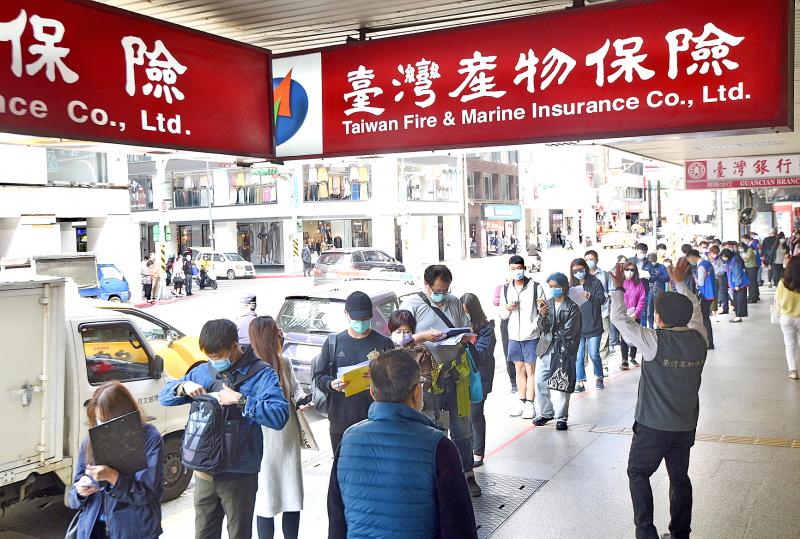As of Monday last week, Taiwan’s insurers had sold 7.15 million policies covering losses due to COVID-19-related quarantines and vaccine adverse reactions, up 42 percent from the end of last month, as a surge in COVID-19 cases prompted people to seek insurance coverage, Financial Supervisory Commission data showed on Thursday.
Ninety-one percent of them, or 6.51 million policies, are designed to cover losses incurred by people infected with the virus, or under quarantine or home isolation after being listed as a contact of a confirmed case, up 29 percent from 5.04 million policies sold at the end of last month, the data showed.
As of Monday last week, insurers’ cumulative sales totaled NT$4.06 billion (US$145.5 million), up 57 percent from NT$2.58 billion at the end of last month, the data showed.

Photo: Peter Lo, Taipei Times
Another 9 percent, or 640,392 policies, cover side effects and adverse reactions to COVID-19 vaccines, including in the case of hospitalization or death, more than doubling from 309,000 policies sold at the end of last month, it showed.
Cumulative sales of vaccine policies grew 103 percent to NT$181 million over the period, the data showed.
COVID-19-related insurance policies have become popular among the public since an outbreak of domestic virus cases last month.
After reports of adverse reactions and older people dying after COVID-19 vaccination, people have rushed to buying the policies before getting vaccinated, the commission said.
As of Monday last week, 5,053 policyholders had been compensated, with a total payout of NT$392 million, the commission said.
Most people were compensated after being quarantined as contacts of COVID-19 cases or being hospitalized for treatment of the virus, it said.
The biggest player in the COVID-19 insurance market is Taiwan Fire & Marine Insurance Co (台灣產物保險), which has a policy that charges NT$500 and pays out NT$100,000 if the policyholder is ordered to quarantine.
As of Monday, it had sold 3.75 million policies with cumulative premiums of NT$1.79 billion, the commission said.
The company had paid NT$330 million to compensate 3,396 policyholders, the commission said.

Hon Hai Precision Industry Co (鴻海精密) yesterday said that its research institute has launched its first advanced artificial intelligence (AI) large language model (LLM) using traditional Chinese, with technology assistance from Nvidia Corp. Hon Hai, also known as Foxconn Technology Group (富士康科技集團), said the LLM, FoxBrain, is expected to improve its data analysis capabilities for smart manufacturing, and electric vehicle and smart city development. An LLM is a type of AI trained on vast amounts of text data and uses deep learning techniques, particularly neural networks, to process and generate language. They are essential for building and improving AI-powered servers. Nvidia provided assistance

DOMESTIC SUPPLY: The probe comes as Donald Trump has called for the repeal of the US$52.7 billion CHIPS and Science Act, which the US Congress passed in 2022 The Office of the US Trade Representative is to hold a hearing tomorrow into older Chinese-made “legacy” semiconductors that could heap more US tariffs on chips from China that power everyday goods from cars to washing machines to telecoms equipment. The probe, which began during former US president Joe Biden’s tenure in December last year, aims to protect US and other semiconductor producers from China’s massive state-driven buildup of domestic chip supply. A 50 percent US tariff on Chinese semiconductors began on Jan. 1. Legacy chips use older manufacturing processes introduced more than a decade ago and are often far simpler than

STILL HOPEFUL: Delayed payment of NT$5.35 billion from an Indian server client sent its earnings plunging last year, but the firm expects a gradual pickup ahead Asustek Computer Inc (華碩), the world’s No. 5 PC vendor, yesterday reported an 87 percent slump in net profit for last year, dragged by a massive overdue payment from an Indian cloud service provider. The Indian customer has delayed payment totaling NT$5.35 billion (US$162.7 million), Asustek chief financial officer Nick Wu (吳長榮) told an online earnings conference. Asustek shipped servers to India between April and June last year. The customer told Asustek that it is launching multiple fundraising projects and expected to repay the debt in the short term, Wu said. The Indian customer accounted for less than 10 percent to Asustek’s

Gasoline and diesel prices this week are to decrease NT$0.5 and NT$1 per liter respectively as international crude prices continued to fall last week, CPC Corp, Taiwan (CPC, 台灣中油) and Formosa Petrochemical Corp (台塑石化) said yesterday. Effective today, gasoline prices at CPC and Formosa stations are to decrease to NT$29.2, NT$30.7 and NT$32.7 per liter for 92, 95 and 98-octane unleaded gasoline respectively, while premium diesel is to cost NT$27.9 per liter at CPC stations and NT$27.7 at Formosa pumps, the companies said in separate statements. Global crude oil prices dropped last week after the eight OPEC+ members said they would